八年级上册Unit1 动词过去式含答案
- 格式:doc
- 大小:20.00 KB
- 文档页数:4

Unit 1 Where did you go on vacation?分层同步作业Grammar Focus巩固基础练一.写出下列单词的过去式。
1.get —2.say —3.have —4.be—5.tell —6.think —7.write —8.drive —9.run —10.read —11. see—12. stand —13. put —14. eat —15. buy —16. drink —17. sleep —18. come —19. play —20. study —二.句型转换1. Mike arrived at school on time this morning. (改为否定句)Mike _______ _______ at school on time this morning.2. I called Bob two hours ago. (改为一般疑问句)_______ _______ _______ Bob two hours ago?3. Alice visited her grandparents yesterday afternoon. (对划线部分提问)_______ _______ Alice _______ her grandparents?4. Jack went to the zoo on his birthday. (对划线部分提问)_______ _______ Jack _______ on his birthday?5. Molly and Danny were in the computer room. (对划线部分提问)_______ _______ in the computer room?三.单项选择1. Could you stay a little longer? I have _______ more to tell you about the plan (计划) fortomorrow.A. somethingB. everythingC. anythingD. nothing2. he sports meeting will be held (举行) in September, but _______ knows the date for sure.A. nobodyB. nothingC. anybodyD. anything3. Learning is a lifelong (终身的) journey because we can learn _______ every day.A. nothing newB. new somethingC. something new4. I don’ t want to be _______ else. I just wa nt to be _______.A. anybody; myselfB. somebody; myselfC. everybody; meD. anybody; me5. —Is _______ here?—No. Rick and Jane aren’ t here. They are in the library.A. everyoneB. anyoneC. someoneD. no one能力提升练一. 根据语境,从方框中选择恰当的词语填空。

一般过去时的概念及用法一、基本概念一般过去时(simple past tense)表示过去某个时间里发生的非持续性动作或存在的状态,也表示经常或反复发生的动作。
用动词的过去式表示,常和表示过去的时间状语连用,如:yesterday,last night,in 1990,two days ago,before,the age of等。
一般过去时也表示过去经常或反复发生的动作,常和often,always等表示频率的时间状语连用。
表示过去习惯性、经常性的动作、行为;过去主语所具备的能力和性格。
二、动词变化1.直接加ed: work—— worked look——looked2.以不发音e结尾的单词,直接加d: live ——lived hope——hoped use——used 3.以辅音字母+y结尾的,变y为i加ed: study——studied carry——carried worry——worried4.以一个辅音字母结尾的,双写最后的辅音字母+ed: stop——stopped plan——planned重读闭音节体现形式为辅-元-辅结构,例如nod, n为辅音,o为元音,d为辅音。
5. 以ic结尾的动词,要把ic变成ick再加ed,如picnic→picnicked,traffic→trafficked 6.不规则变化的动词过去式:have---had are---were get---got say---said feel---felt do/does---did is---was go---went drink--drank eat--ate bring----brought think----thought buy----bought catch---- caught teach ---- taught sit----sat wear----wore cut----cut sweep----sweptsleep——slept see----saw become----became read——read7.以辅元辅结尾的加d三、用法(1)一般过去时表示在过去某个特定时间发生,也可以表示过去习惯性、经常性的动作。

一、选择题1.---Have you read this book?---Yes.I _______ it two weeks ago.A.am reading B.have read C.will read D.read D解析:D【解析】句子有过去时间状语two weeks ago,用一般过去时,read的过去式同原形read.2.The little girl could look after _______ though she was only five years old.A.she B.her C.hers D.herself D解析:D【解析】句意:这个小女孩虽然只有五岁,却能照顾自己。
固定结构look after oneself自理、自己照顾自己。
she人称代词,她自己;herself反身代词,她自己。
故选D。
3.—I feel tired and sleepy.—Why not stop ______ for a while?A.rest B.to rest C.resting D.rested B解析:B【详解】试题分析:句意:--我感到疲劳和困倦。
---为什么不停下来休息一会儿。
短语stop to do sth.表示停下来去做某事;stop doing sth停止做某事;结合语境,故选B。
4.一Did you visit the Great Wall on your vacation ?一_________.A.Yes, I did B.No, I didC.Yes, I didn’t D.Yes, I do A解析:A【详解】句意:——你假期去游览长城了吗?——是的,我做到了。
考查一般疑问句及回答。
问句助动词did是过去式,回答需用did的相关形式,可排除D项的do(用于一般现在时)。
BC两项前后矛盾,可排除;故选A。
5.My father seems _______busy today , so I must help him .A.be B.to C.to be D.being C解析:C【详解】句意:我父亲今天似乎很忙,所以我必须帮助他。

一、选择题1.-Dave has friends here, so he often stays at home by himself and feels lonely. A.many B.a few C.few D.several C解析:C【解析】【详解】句意:戴夫在这里几乎没有朋友,所以他经常独自呆在家里,感到孤独。
根据“friends”可知这是可数名词复数。
根据“he often stays at home by himself and feels lonely.”可知他经常自己在家,感觉孤独,故他是几乎没有朋友的。
many很多,大量;a few一点;several几个。
表肯定意义。
few表示几乎没有,表否定意义。
故选C。
2.It’s rainy outside, so we decide ______ at home and watch TV.A.stay B.to stay C.stayed D.staying B解析:B【详解】句意:外面下雨了,所以我们决定呆在家里看电视。
Astay 动词原形;Bto stay动词不定式Cstayed过去式 Dstaying现在分词或动名词形式。
decide to do sth. 决定去做某事。
后跟动词不定式做宾语。
A/C/D三者都不是动词不定式。
故选B。
3.Mrs. Brown is nice. Every day she tried to cook__________ for me during my stay in Canada. A.something differentB.anything differentC.nothing different A解析:A【解析】试题分析:something一些东西,一般用于肯定句及表示请求建议等含义的疑问句中;anything也是表示一些东西,任何东西,一般用于否定及疑问句中。
Nothing没有东西,用于肯定句表示否定含义;修饰这些由thing组成的符合词的形容词一般放在这些词的后面。

练习题Unit 1 Where did you go on vacation?第一课时(Section A 1a-1c)预习检测:1.写出以下动词的过去式:go _______________ stop ___________________ visit _____________study____________do __________ ride____________ take_____________ drive__________arrive___________walk____________ sleep ___________keep___________ get___________ 2.翻译以下短语:参加夏令营 ______________________________去大山________________________________去海滩 _______________________________ 观光博物馆 ________________________________呆在家 ______________________________拜见我的叔叔______________________________ 3.用词的正确形式填空1.I _________( like ) oranges when I was young( 年青的 ).But now I __________(not like) them.2.My mother often ____________( stay) at home on Sundays, but last Sunday she_________ ( not stay) at home , she _________(go) to the park.3.Wei Hua __________ (have)a busy day yesterday.4 .He ___________(visit) the Great Wall (长城)last year.5.We____________(have) a good time yesterday.6.We often __________(go) to school by bus last year.7.I __________(live)in the village when I was a child.9Mike__________(see) a big tiger in the park last year.10.Sam___________ (do) the housework yesterday.11.________(do) you _________(enjoy) yourself yesterday?12.________(do)you __________(play) the violin in the art room yesterday?No, I didn't. I___________(draw)some pictures there.课后作业:1.She watered the flowers ________.A tomorrow B sometimes C yesterday morning2.What ____ Mike do last weekend ?A do B does C did3.I ___ my room last Sunday.A cleaned B clean C am cleaning4.I often help my mother _____housework.A does B did C do5._____ you _____ TV last night . A Do, watch B Did, watch C Did, watched6.---Did your father write an e-mail yesterday?--_______.A Yes, he did.B Yes, he doesC No, he don’t7.They _____ on a trip in February ,2007.A are going B going C went8.We’ re going to _____ mountains tomorrow .A climb B climbed C climbing9.____ he ____ football two days ago? A Does , play B Did , played C Did , play10.----Good afternoon, Miss Lee. How does Mike feel?-----He’ s tired . He ____ a lot of work ______ .A does , this morningB do , this morningC did , this morning用所给词的适合形式填空,必需时增添助动词。

Unit1. Where did you go on vacation因为19.one bowl of… 一碗…… 20.the next day 第二天21.drink tea喝茶22.find out找出;查明23.go on继续24.take photos照相25.something important重要的事 26.up and down上上下下27.have a good time玩得高兴=enjoy oneself=have (great) fun1.与seem有关的句式1)seem + 形容词“看起来…..” You seem happy today.2)seem + to do sth. “似乎、好像做某事” I seem to have a cold3)It seems / seemed + 从句“看起来好像…;似乎…”. It seems that no one believe you.4)seem like ….“好像,似乎…..” It seems like a good idea.2. too many,too much,much too1)too many “太多”,后接可数名词复数。
如:Mother bought too many eggs yesterday.2)too much “太多”,修饰不可数名词或修饰动词作状语。
如:3)much too “太”,修饰形容词或副词。
如:小结:分辨三者的口诀: too much, much too, 用法区别看后头: much 后接不可数, too 后修饰形或副。
too many 要记住,后面名词必复数。
7. because:1)because of 介词短语,“因为,由于”,后接名词、代词或动名词,不能接句子。
如:H e can’t take a walk because of the rain.2)because 连词,“因为”,引导状语从句,表示直接明确的原因或理由。

八年级英语上册Unit 1语法(1):复合不定代词或副词的构成及用法构成:由some, any, no, every分别加上-body, -thing, -one.构成的不定代词叫做复合不定代词;即:加上-where构成复合不定副词。
即:用法:(1)复合不定代词在句中可以作主语,谓语动词用单数Everybody (have)a dreamThere (be)nothing wrong with my bikeListen , somebody (sing) in the room(2)something somebody someone some where 通常用于肯定句中;Anything anybody anyone anywhere则多用于否定句、疑问句中。
但something somebody someone some where可用于表请求、邀请、预料对方会作肯定回答时的疑问句中。
常见的有:Nothing nobody nowhere 本身表示否定含义不能和否定词not hardly 等连用everything everybody everyone everywhere 表示全体所有一切的意思根据情况用于肯定句否定句疑问句中(3)形容词修饰不定代词时,通常要放在不定代词之后. 形容词修饰不定代词要后置。
There is something delicious on the table.(4)somewhere, anywhere, nowhere, everywhere用作副词。
Flowers come out everywhere.一用复合不定代词或不定副词填空:1. I can’t hear anything = I can hear ________ _.2. There is _________ on the floor. Please pick it up.3. Did ______ _ go to play basketball with you ?4. I phoned you last night, but ________ answered it.5. Maybe _________ put my pencil _________. I can’t find it ______.6. Could you give me ___________ to eat ?7 there is not __________ in the box it is empty (空的)8 . _________here, no one is away9 . I didn’t find _____ ( someone ) there.10 . Is there ______ _( something ) important in today’s newspaper?三单选1 . No one ________ how to do it.A.knowB. knowsC. knowingD. knew2. Everything_____ OK, isn’t it? A. was B. are C. and D. is3. There’s________in the newspaper. You should read it.A. important somethingB. something boringC. boring somethingD. something important.4.There is _______ in today’s news you don’t need wacth itA. new something B .anything newC . something newD .nothing new13 ---- Did you buy ______ special? ---- No, I didn’t.A. somethingB. some thingsC. anything15 ________ ready now, let’s begin.A.Everything isB.Something are C .Nothing are D.Anything is16.I’m free now, I have _________ to do .A.EverythingB.Something C .Nothing D.Anything语法(2)一般过去时1.一般过去时用法:一般过去时表示过去某时间发生的动作或存在的状态或过去经常性发生的事作,常和过去时间状语连用:yesterday, last night ,two days ago,in 2000, at that time, when 等引导的含过去时的句子。
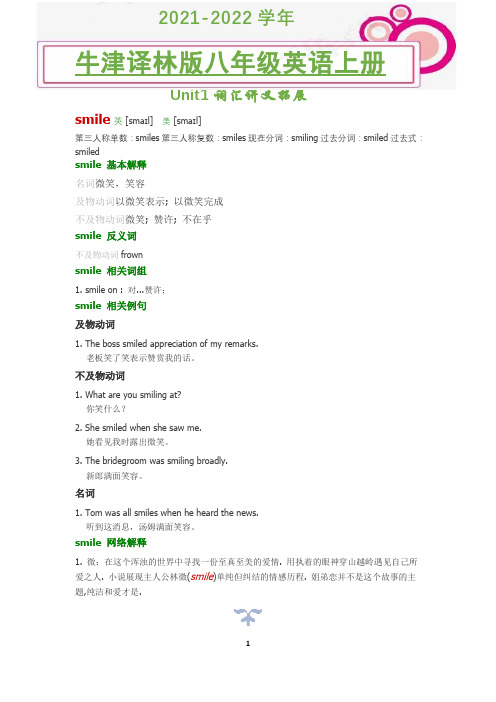
Unit1词汇讲义拓展smile英 [smaɪl]美 [smaɪl]第三人称单数:smiles第三人称复数:smiles现在分词:smiling过去分词:smiled过去式:smiledsmile 基本解释名词微笑,笑容及物动词以微笑表示; 以微笑完成不及物动词微笑; 赞许; 不在乎smile 反义词不及物动词frownsmile 相关词组1. smile on : 对...赞许;smile 相关例句及物动词1. The boss smiled appreciation of my remarks.老板笑了笑表示赞赏我的话。
不及物动词1. What are you smiling at?你笑什么?2. She smiled when she saw me.她看见我时露出微笑。
3. The bridegroom was smiling broadly.新郎满面笑容。
名词1. Tom was all smiles when he heard the news.听到这消息,汤姆满面笑容。
smile 网络解释1. 微:在这个浑浊的世界中寻找一份至真至美的爱情. 用执着的眼神穿山越岭遇见自己所爱之人. 小说展现主人公林微(smile)单纯但纠结的情感历程. 姐弟恋并不是这个故事的主题,纯洁和爱才是.Unit1词汇讲义拓展smile 词典解释1. 微笑;笑When you smile, the corners of your mouth curve up and you sometimes show your teeth. People smile when they are pleased or amused, or when they are being friendly.e.g. When he saw me, he smiled and waved...他看见我的时候,微笑着朝我挥挥手。
e.g. He rubbed the back of his neck and smiled ruefully at me...他挠了挠脖梗儿,对我苦笑了一下。
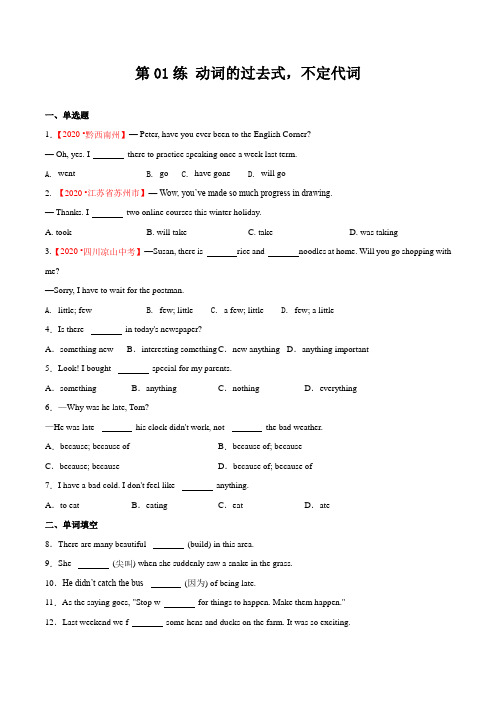

八年级上册课堂笔记(1-6单元)Unit 1 Where did you go on vacation?1,一般过去时基本结构:主语+动词过去式+其他;否定形式:①was / were + not; ②在行为动词前加didn't,同时还原动词;一般疑问句:①Was/Were+主语+其他?②Did+主语+动词原形+其他?2,动词过去式规则变化:直接加ed;以不发音e结尾的单词,直接加d;以辅音字母+y结尾的,变y为i加ed;以元音字母+y结尾的,直接加ed;以重读闭音节结尾的,双写最后的辅音字母+ed不规则变化的动词过去式(见书本最后一页)3,go on vacation去度假be on vacation在度假4,a nyone任何人,只用于指人,一般用在否定句、疑问句中,后面不接of 短语。
做主语时位于动词用单数。
Eg:Is there anyone at home?any one任何一个,指人或物,后面接of 短语。
Eg:You can take any one of these books. 5,adj修饰不定代词后置anything special something importantenough作adv,修饰adj/ adv 后置old enough fast enoughelse作adj,修饰疑问代词和不定代词后置what else who else something else 6,quite a few/ little 相当多7,How/ what about+V-ing/ n/ 代词…怎么样?(表建议、询问)8,most students= most of the students“one of +the most +adj +n复数”表示“最…之一”Eg:He is one of the most famous writers in China.A most +adj +n 非常Eg:Hangzhou is a most beautiful city.9,buy/ get sb sth= buy/ get sth for sb10,what do you think of/ about…?= how do you like…?你认为…怎么样?11,have fun,enjoy oneself,have a good/ great/ wonderful time+V-ing,12,主语+ seem+(to be)+表语(n/adj)eg:Tom seems to be a smart boy/ happy.It seems that从句eg:It seems that he understand.主语+ seem to do sth eg:He seems to understand.13,adj 以-ing结尾“令人…的”exciting,interesting,relaxing,boring以-ed结尾“人感到…的”excited,interested,relaxed,bored14,询问价格:How much is…? What’s the price of…?表示价格高低:…be expensive/ cheapThe price of …is high/ low15,get to, arrive in/at, reach,到达(如果后面接地点的副词home,here或there,就不用介词in ,at, to)16,decide(not)to dodecide that从句decide+疑问词+不定式17,try(not)to do sth尽力try doing sth 尝试try/ do one’s best to do sthtry it on试穿(动副结构)try out试验have a try试一试18,feel like感觉像feel like doing sth/ want to do sth/ would like to do sth19,a lot of= lots of =plenty of20,in the past在过去21,enjoy/ like doing22,感叹句:How+adj+主谓!How+adj+a/an +n单+主谓!What+ a/an +adj+ n单+主谓!What+ adj+ n复/ 不可数+主谓!23,more than=over超过less than 少于more or less或多或少24,wait for等待25,too many“太多”修饰可数名词复数too much“太多”修饰不可数名词much too“实在太”修饰形容词或副词26,because+从句because of +n/ V-ing /代词27,enough作adj修饰n,enough time enough moneyhave enough…to do sth eg:I have enough time to finish the work.enough作adv修饰adj/ adv old enough fast enough…enough for sb to do sth eg:The job is easy enough for me to do.not…enough to do The book isn’t easy enough for me to read.too…to…The book is too difficult for me to read.so…that…The book is so difficult that I can’t read.28,the next day第二天29,remember/ forget+to do要做+doing做过30,Stop sb from doing sth阻止Stop to do 停下来去做其他事Stop doing 停止正在做的事31,another two hours=two more hours32,at the top of在…顶端,名列…之前强调点on the top of在…上面强调面33,find out查明,弄清find找到(结果)look for寻找(过程)34,go on with/ doing sth继续原来的事go on to do sth继续做别的事35,so +adj +that +结果状语从句“如此……以致……”eg:I was so busy that I didn’t go to sleep for 3 days.so that 引导目的状语从句,以便,为了(in order to)eg:they got up early so that they could catch the early bus.so +adj +(a/ an+n单数)that It is so important a meeting that I can’t miss it.such+ a/ an+ adj + n单数+that It is such an important meeting that I can’t miss it.such+ adj+n复数/不可数+thatUnit 2 How often do you exercise?1,How如何(方式)how long多长(时间)答语常用“(For/ about +)时间段”how far多远(距离)答语常用“(It’s +)数词 +miles/ meters/ kilometers”how often多久一次(频率)答语常用“Always/ often/ every day/…”或“次数+时间”等表频率的状语How soon多快,多久以后,常用在将来时中。

Unit 1 Where did you go on vacation?你到哪里去度假了?我去了纽约。
知识点一.动词短语:①去度假①呆在家①上山/进山①到海边去①参观博物馆①去夏令营常用短语:1.相当多2.为……学习3.出去4.大部分时间绝大多数时间5.尝起来味道好6.玩的开心7.当然可以8.感觉像…/想要9.购物10.在过去11.绕……走12.太多(可数名词前面)13.因为14.一碗……15.查出来/发现16.继续17.照相18.重要的事情19.上上下下20.出来知识点二.句型:1.你昨天下午干什么了?2.我和我的朋友一起打网球了。
动词过去式变化规则:写出下列动词的过去式:1.A-A-A型(10个)2.A—B—A型(共3个)3.A—B—B型(共47个)4.A—B—C型(共41个)5.A—A—B型(共1个)练习:1.今天早上我和家人到达了马来西亚槟城。
2.天气晴朗且炎热,因此我们决定去我们宾馆附近的海滩。
3.我们决定今晚不去参加聚会4.莉萨于昨日到达北京5.他是怎样到校的?6.请按时到电视台小结: get, arrive, reach用法--知识点三:你去什么有趣的地方了吗?复合不定代词:复合不定代词考点:1.2.3.练习:1.我在什么地方都没找到它。
2.我记得在哪儿见过他3.Is ________ here? —No, Bob and Tim have asked for leave.A. anybodyB. somebodyC. everybodyD.nobody4.你买什么特殊的东西了吗?5.昨晚在我家附近,我看见一个陌生人躺在地上。
知识点四:1. 我们在那里拍了相当多的照片。
2.有几粒豆子 几乎没有豆子几乎没有牛奶 有一点牛奶知识点五:1. 我真的很喜欢在镇上到处走走。
单元练习:1.It ______sunny today ,but it ______ cloudy yesterday. A .is ;is B .was ;wasC .is ;wasD .was ;is2.______ there any students in the classroom?--No ,there aren't.But there ______ some half an hour ago. A .Are ;were B .Were ;areC .Are ;areD .Were ;were3.Where ______ you last night?---I ______ at home. A .are ;am B .am ;amC .were ;wasD .were ;were4.______ Nancy at home last weekend?---No,she ______.She was in the library with her friends. A.Is;isn't B.Was;wasn't C.Did;didn't D.Was;isn't5.______ did you ______ for dinner?---Sichuan food.A.What;have B.When;had C.Why;have D.How;have6.This movie is kind of boring.I don't really ______ it.A.see B.look C.enjoy D.want7.I didn't go to the beach ______ vacation.I stayed ______ home.A.for;in B.on;at C.on;in D.in;at8.Could you give me ______ money?---Sorry.I don't have ______ with me.A.some;any B.little;some C.any;some D.little;any9.I'll buy ______ for my son,but ______ for myself.A.nothing;nothing B.anything;nothing C.something;nothing D.something;something 10.Did you do ______ in the park last Sunday?A.something interesting B.interesting something C.anything interesting D.interesting anything11.It ______ that he went there last weekend.A.seems B.seemed C.looks D.looked12.The boy is ______ to carry the box.A.enough strong B.enough strongly C.strong enough D.strongly enough13.I felt like ______ in the sky like a bird.A.fly B.flew C.am flying D.flying14.—How did you feel about the trip?--______.A.By train B.I'm very tired C.It was great D.The weather was fine完形填空teacher.We 10 on Children's Day yesterday.1.A.went B.went to C.went for D.went in2.A.to B.from C.with D.of3.A.Those were B.How C.Had D.There were4.A.are B.was C.were D.did5.A.They B.Them C.Their D.Theirs6.A.hills B.boats C.flowers D.trees7.A.here B.over C.over there D.near8.A.swim B.swimming C.swimmed D.swam9.A.a B.an C./ D.the10.A.liked B.enjoyed C.had great fun D.did。
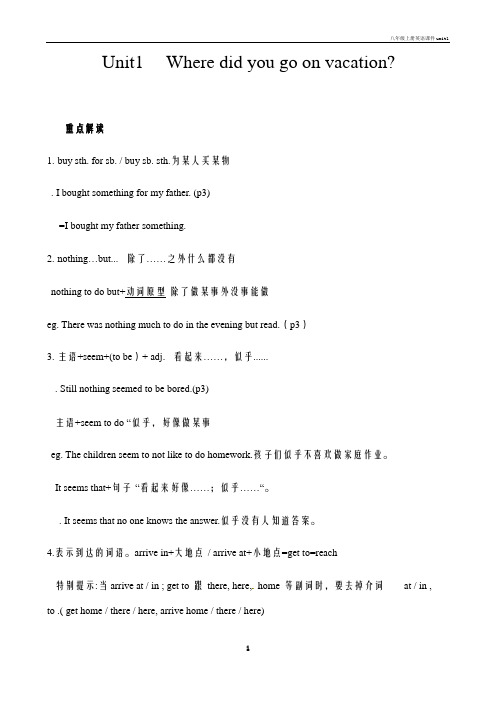
Unit1 Where did you go on vacation?重点解读1.buy sth. for sb. / buy sb. sth.为某人买某物. I bought something for my father. (p3)=I bought my father something.2.nothing…but... 除了……之外什么都没有nothing to do but+动词原型除了做某事外没事能做eg. There was nothing much to do in the evening but read.(p3)3.主语+seem+(to be)+ adj. 看起来……,似乎....... Still nothing seemed to be bored.(p3)主语+seem to do “似乎,好像做某事eg. The children seem to not like to do homework.孩子们似乎不喜欢做家庭作业。
It seems that+句子“看起来好像……;似乎……“。
. It seems that no one knows the answer.似乎没有人知道答案。
4.表示到达的词语。
arrive in+大地点/ arrive at+小地点=get to=reach特别提示:当arrive at / in ; get to 跟there, here,home 等副词时,要去掉介词at / in , to .( get home / there / here, arrive home / there / here)to do sth.决定去做某事decide not to do sth. 决定不做某事decided to go to the beach near our hotel. (p5)I decided not to tell him the bad news.我决定不告诉他这个坏消息。

八年级上册英语第一单元讲解
八年级上册英语第一单元的主题是“Unit 1 Where did you go on vacation?”。
以下是该单元的讲解:
1. 语法:该单元主要学习一般过去时态,用于描述过去发生的事情。
学生需要掌握一些常用的不规则动词过去式,例如:go-went,do-did,see-saw 等。
2. 词汇:该单元的词汇主要与度假和旅游相关,例如:beach、mountain、parade、museum、headache等。
学生需要掌握这些单词的拼写和用法,以便在阅读和写作中正确使用。
3. 句型:该单元的句型包括一般过去时的肯定句、否定句和疑问句,例如:“I went to the beach last summer.”、“She didn’t go to the mountains.”、“Did you go to the parade?”等。
学生需要掌握这些句型的结构和用法,以便在口语和写作中正确使用。
4. 课文:该单元的课文是关于一个人在假期中的旅行经历,包括去了哪些地方、做了什么事情等。
学生需要理解课文的内容,并回答课文后的问题。
5. 练习:该单元的练习包括词汇练习、语法练习和阅读理解练习等。
学生需要通过练习巩固所学知识,提高英语语言能力。
总之,八年级上册英语第一单元主要学习一般过去时态的用法,学生需要掌握相关的语法、词汇、句型和课文,并通过练习巩固所学知识。
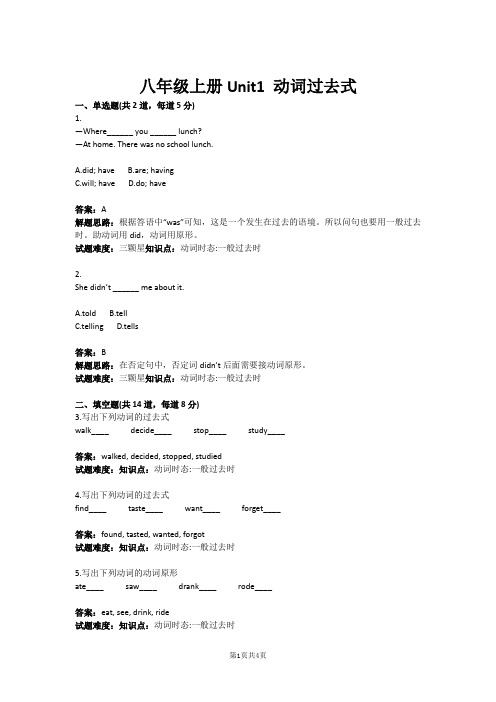
八年级上册Unit1 动词过去式一、单选题(共2道,每道5分)1.—Where______ you ______ lunch?—At home. There was no school lunch.A.did; haveB.are; havingC.will; haveD.do; have答案:A解题思路:根据答语中“was”可知,这是一个发生在过去的语境。
所以问句也要用一般过去时。
助动词用did,动词用原形。
试题难度:三颗星知识点:动词时态:一般过去时2.She didn’t ______ me about it.A.toldB.tellC.tellingD.tells答案:B解题思路:在否定句中,否定词didn’t后面需要接动词原形。
试题难度:三颗星知识点:动词时态:一般过去时二、填空题(共14道,每道8分)3.写出下列动词的过去式walk____ decide____ stop____ study____答案:walked, decided, stopped, studied试题难度:知识点:动词时态:一般过去时4.写出下列动词的过去式find____ taste____ want____ forget____答案:found, tasted, wanted, forgot试题难度:知识点:动词时态:一般过去时5.写出下列动词的动词原形ate____ saw____ drank____ rode____答案:eat, see, drink, ride试题难度:知识点:动词时态:一般过去时6.写出下列动词的动词原形felt____ had____ got____ started____答案:feel, have, get, start试题难度:知识点:动词时态:一般过去时7.根据提示填空Mary ____(try) to get to Beijing on Sunday, but she failed at last.答案:tried解题思路:由句中“failed”可知,这是一个发生在过去的语境,所以动词try也要用过去式tried。

一、选择题1.Hangzhou is a beautiful city. There are many people here _______ vacation.A.to B.on C.for D.in2.We couldn’t go shopping ________ the bad weather .A.because of B.because C.and D.so3.一Did you visit the Great Wall on your vacation ?一_________.A.Yes, I did B.No, I didC.Yes, I didn’t D.Yes, I do4.My father seems _______busy today , so I must help him .A.be B.to C.to be D.being 5.We ________ Beijing at 10 p.m. yesterday.A.arrive at B.arrived in C.arrived at D.arrive in 6.Can you help me ________ a taxi?A.look B.give C.find D.think 7.We had great fun ________ the volleyball match.A.watch B.watched C.watches D.watching 8.Last summer vacation, we ______ many photos when we had a trip to Dalian. A.take B.takes C.took D.will take 9.The little girl could look after _______ though she was only five years old.A.she B.her C.hers D.herself 10.I had no money and I couldn't buy for my parents.A.nothing B.anyone C.anything D.something 11.—Did Mary go to the park with you yesterday afternoon?—No. She decided ________ at home in the end.A.stay B.stayed C.to stay D.staying 12.I didn’t enjoy going out _______ the crowded streets.A.and B.because C.but D.because of 13.---Where did you go on May Day of 2013?---I wasn’t out. I just ______ a t home.A.stayed B.staying C.stay D.to stay 14.— Why not ________ John a toy car for his birthday?— Good idea! He is crazy about cars.A.buy B.buying C.to buy D.buys 15.一What did your sister do last summer ?一 She_______my aunt and stayed there for two weeks .A.visit B.visited C.visits D.will visit 16.What you every weekend when you were in Grade 7?A.will; do B.did; doC.do; do D.are; doing17.—How often do you chat with your friends online?—________. I'm busy with my study.A.Only once a month B.For a month C.Almost every day D.Maybe in two weeks18.—I will have to get in ________ the big window because I left my keys in the room.—I think you should wait for your parents to come back.A.over B.across C.below D.through19.—I usually get up at six o'clock in the morning. What about you?—I ________ get up so early. I usually get up at 7: 00.A.sometimes B.often C.always D.never20.I didn't get to school on time this morning the heavy rain.A.because B.because of C.so D.in【参考答案】***试卷处理标记,请不要删除一、选择题1.B解析:B【解析】【详解】句意:杭州是个美丽的城市。
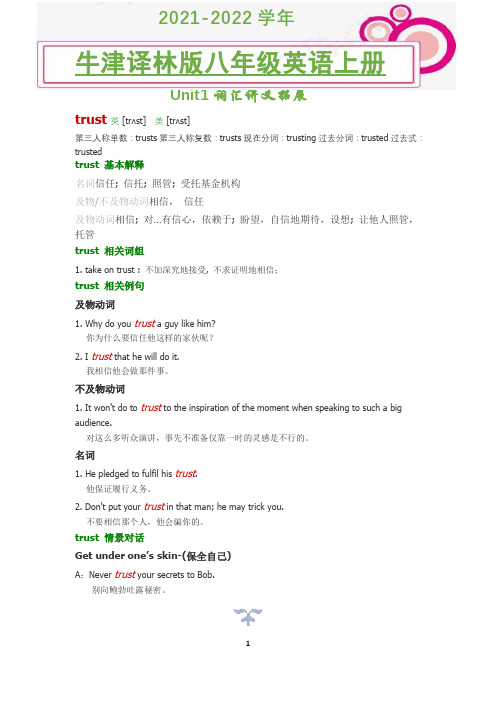
Unit1词汇讲义拓展trust英 [trʌst]美 [trʌst]第三人称单数:trusts第三人称复数:trusts现在分词:trusting过去分词:trusted过去式:trustedtrust 基本解释名词信任; 信托; 照管; 受托基金机构及物/不及物动词相信,信任及物动词相信; 对…有信心,依赖于; 盼望,自信地期待,设想; 让他人照管,托管trust 相关词组1. take on trust : 不加深究地接受, 不求证明地相信;trust 相关例句及物动词1. Why do you trust a guy like him?你为什么要信任他这样的家伙呢?2. I trust that he will do it.我相信他会做那件事。
不及物动词1. It won't do to trust to the inspiration of the moment when speaking to such a big audience.对这么多听众演讲,事先不准备仅靠一时的灵感是不行的。
名词1. He pledged to fulfil his trust.他保证履行义务。
2. Don't put your trust in that man; he may trick you.不要相信那个人,他会骗你的。
trust 情景对话Get under one’s skin-(保全自己)A:Never trust your secrets to Bob.别向鲍勃吐露秘密。
Unit1词汇讲义拓展B:I think he’s kind and honest.我倒认为他为人不错,挺诚实的。
A:He’s the kind of perso n who do anything to save his own skin.他是那种为了保全自己什么都肯做的人。
B:I don’t agree with you.我不能同意你的看法。
八年级上册Unit1 动词过去式
一、单选题(共2道,每道5分)
1.
—Where______ you ______ lunch?
—At home. There was no school lunch.
A.did; have
B.are; having
C.will; have
D.do; have
答案:A
解题思路:根据答语中“was”可知,这是一个发生在过去的语境。
所以问句也要用一般过去时。
助动词用did,动词用原形。
试题难度:三颗星知识点:动词时态:一般过去时
2.
She didn’t ______ me about it.
A.told
B.tell
C.telling
D.tells
答案:B
解题思路:在否定句中,否定词didn’t后面需要接动词原形。
试题难度:三颗星知识点:动词时态:一般过去时
二、填空题(共14道,每道8分)
3.写出下列动词的过去式
walk____ decide____ stop____ study____
答案:walked, decided, stopped, studied
试题难度:知识点:动词时态:一般过去时
4.写出下列动词的过去式
find____ taste____ want____ forget____
答案:found, tasted, wanted, forgot
试题难度:知识点:动词时态:一般过去时
5.写出下列动词的动词原形
ate____ saw____ drank____ rode____
答案:eat, see, drink, ride
试题难度:知识点:动词时态:一般过去时
6.写出下列动词的动词原形
felt____ had____ got____ started____
答案:feel, have, get, start
试题难度:知识点:动词时态:一般过去时
7.根据提示填空
Mary ____(try) to get to Beijing on Sunday, but she failed at last.
答案:tried
解题思路:由句中“failed”可知,这是一个发生在过去的语境,所以动词try也要用过去式tried。
试题难度:知识点:动词时态:一般过去时
8.根据提示填空
They ____(visit) Xinjiang last summer and they ____(enjoy) the grapes(葡萄) there.
答案:visited, enjoyed
解题思路:由句中last summer可知,这是一个发生在过去的语境,所以动词要用过去式。
visit的过去式是visited,enjoy的过去式是enjoyed。
试题难度:一颗星知识点:动词时态:一般过去时
9.根据提示填空
Peter ____(is) ill yesterday. He____(stay) at home, and he ____ ____(not, go) anywhere.
答案:was, stayed, didn’t, go
解题思路:由句中yesterday可知,这是一个发生在过去的语境,所以动词要用过去式。
is 的过去式是was/were,stay的过去式是stayed,go的否定形式是didn’t go。
试题难度:知识点:动词时态:一般过去时
10.根据提示填空
She ____(arrive) here yesterday afternoon, and ____(take) the letter away.
答案:arrived, took
解题思路:由句中yesterday afternoon可知,这是一个发生在过去的语境,所以动词要用过去式。
arrive的过去式是arrived,take的过去式是took。
试题难度:知识点:动词时态:一般过去时
11.根据提示填空
—Why don’t you go shopping with us?
—I ____(dislike) it. So I want to stay at home.
答案:dislike
解题思路:根据语境,在表示个人的主观意愿和喜好时,用一般现在时。
所以此空用一般现在时dislike。
试题难度:知识点:动词时态:一般现在时
12.根据提示填空
—How ____(be) your summer camp in Dalian last year?
—Wonderful. I ____(have) a good time with my friends.
答案:was, had
解题思路:由句中“last year”可知,这是一个发生在过去的语境,所以用一般过去时。
be的过去式是was/were,have的过去式是had。
试题难度:知识点:动词时态:一般过去时
13.根据提示填空
He always ____(go) for a walk with his wife, but he ____(go) with his son yesterday.
答案:goes, went
解题思路:由句中“always”可知,经常反复发生的事情,用一般现在时,由于主语是第三人称单数he,所以go要用单三形式goes;由句中“yesterday”可知,后面的句子是在描述过去发生的事情,所以用一般过去时。
go的过去式是went。
试题难度:知识点:动词时态:一般过去时
14.根据提示填空
—____ you ____(buy) anything special yesterday?
—No, I ____(buy) nothing.
答案:Did, buy, bought
解题思路:由句中“yesterday”可知,该句描述的是过去发生的事情,所以要用一般过去时。
buy的过去式是bought。
一般疑问句中,要借助助动词did,后面的动词用原形。
试题难度:知识点:动词时态:一般过去时
15.根据提示填空
I watched TV yesterday. (对加粗部分提问)
____ ____ you ____ yesterday?
答案:What, did, do
解题思路:针对“watched TV”进行提问,要用疑问词what。
在一般过去时中,要借助助动词did,后面的动词用原形。
试题难度:知识点:动词时态:一般过去时
16.根据提示填空
It was sunny and hot all day on Monday. We ____(go) to a beautiful beach. We ____(have)
great fun playing in the water. In the afternoon, we went ____(shop), but the shops ____(be) crowded, so we ____ ____(not, enjoy) it. On Tuesday, we went to a museum. I ____(find)
a boy crying in the corner. He ____(be) lost and I____(help) him find his father. This ____ (make) me feel happy. I didn’t have money for a taxi, so I ____(walk) back to the hotel. On
Wednesday, the weather ____(be) cool, so we ____(decide) to play tennis. It was really fun.
答案:went, had, sh opping, were, didn’t, enjoy, found, was, helped, made, walked, was, decided 解题思路:由句中第一句话“It was sunny...”可知,这是发生在过去的事情,所以文章中描述过去发生的事情时,动词都要用其相应的过去式。
试题难度:一颗星知识点:动词时态:一般过去时。